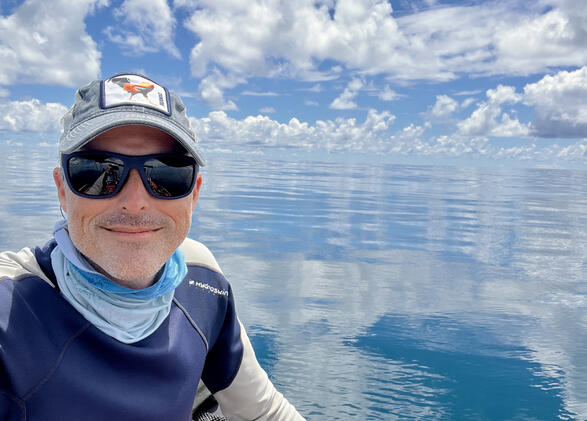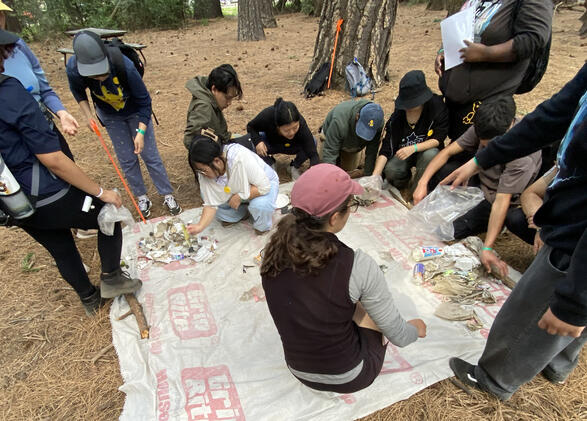Armstrong Scholars Part III: It Couldn’t Be Done

"II think it was about five nights in, we opened ourselves up to the scholars and told them to ask us anything. You have a half-hour and we will tell you 100% the truth up to the point that we’re comfortable with.”
Jenn Peach led the 2017 Armstrong Scholars program alongside Daniella Beinstock. When the 13-day excursion began, the high school-age women saw Jenn as mature, but little else beyond that — she was there to lead and instruct. After Jenn and Daniella held the open conversation period around the campfire, the dynamics of the entire group changed.
“They asked really poignant, honest questions — what it was like to be married and stuff like that,” says Jenn.
One of the memorable questions they fielded around that campfire in the dark: “How do you have the courage to go do things by yourself?”
“I’d mentioned solo backpacking and taking road trips by myself and I think that inspired the question. We went down this rabbit hole of asking who gave me permission to do things by myself, and then me asking them who gave them permission to do things by themselves,” she says.
“At some point I said that I was the person who gave me permission to do things, and it sparked this fascinating conversation about the ‘permission’ to be certain things as a young woman. It opened everyone’s eyes to each other.”
Jenn didn’t see herself as an Armstrong leader when she first started working at NatureBridge in 2014. There has always been a keen interest in many educators to take part in the program in that capacity, and Jenn was comparatively new to the organization. She also lacked the backpacking experience possessed by some of her colleagues who had been living in Yosemite for years.
“I think feeling that way was actually a testament to the amazing group of women who led Armstrong before me,” she says. “It was such a wild, incredible group that it took a while for me to see myself as potentially part of it.”
When Jenn was chosen to lead the 2017 program alongside Daniella, she was thrilled to be taking part in what had become a legendary annual adventure. They were excited to meet the group of young women and bond with them over their two-week trek.
“I was most worried about finding the balance between letting go and staying safe. You want to let the girls take the lead, but we also had to make sure we found good camp sites, stayed on route and had enough supplies,” she says.
Jenn has worked in operations since 2017. A self-described Salesforce and spreadsheets junkie, she finds data and systems fascinating and feels immense gratification when she’s able to increase efficiency. For several years, she was on a trajectory of spending more and more time in the office, taking on director and operations roles at NatureBridge and Camp Galileo.
“I like to plan, I like to have everything all set and ready to go and I like to know the end and be pointing towards it,” she says.
That logistical acumen proved useful in helping to co-plan the 13-day trek into the Yosemite wilderness for Armstrong Scholars, though she had her share of nerves.
“I remember the entire lead up to the trip I was just asking myself ‘Can I do it, can I do it, can I do it?’ And then one day while I was unpacking things for the morning, I realized: oh, I’m doing it.”
Jenn and Daniella also had the unique added stressor of a flood washing out the normal route, making it necessary to improvise and chart a different path for the first time since the program’s inception.
“It caused me a lot of anxiety that we weren’t living up to Armstrong’s standards because it wasn’t in this specific section of high country and all these other things,” says Jenn.
For Jenn, the cure-all for any anxiety and trepidation about the experience was the experience itself. Through the activities, the bonding, the conversations and the challenges inherent in her time in Yosemite with this group of women, Jenn became more comfortable with letting go.
She recalls talking with Daniella about the meaning of Armstrong, and how it wasn’t an exact trail or any one physical thing that made the program special.
“We realized that the legacy is the atmosphere we create, not the space that we’re walking on, and after that we were able to let go and be much more comfortable,” she says.
“We still joke about it to this day; that we could be on a Segway tour of Omaha, Nebraska with this group of girls and it would be just as amazing.”
There was one night before the famous resupply where Jenn had to practice relinquishing control. Traditionally, the scholars put on a playful, short performance for the volunteers bringing them supplies. Jenn and Daniella seeded the idea that it’d be nice to thank the volunteers in some way, so the girls should do whatever made sense to them. Then, they retreated off into the dark wilderness nearby and left them alone.
“There was silence for a long time and we asked each other if we should check in, but we didn’t,” says Jenn. “Then we started hearing these voices singing mashups of Disney and pop music and so much laughter and we just started crying.”
“As an educator, that’s one of my favorite experiences: when you almost step in, then you keep yourself from interjecting and they come through."
We realized that the legacy is the atmosphere we create, not the space that we’re walking on, and after that we were able to let go and be much more comfortable.Jenn Peach
As with many of the Armstrong Scholar program’s participants, Jenn had numerous takeaways from her experience. She learned to let go more easily, became comfortable teaching others how to backpack and grew more appreciative of putting one foot in front of the other during the journey.
“I think the biggest thing I took away from leading Armstrong is that I have agency and a choice,” says Jenn. “If I feel like I’m on the wrong path, I don’t have to stay on that path. I can fix it.”
Jenn stewed on this idea as she considered leaving her job. She’d been in operations since her days at NatureBridge, but she missed meeting new people and being out in the field. Taking a left turn at this juncture meant moving away from home, incurring risk, asking favors from friends and family and much more.
“Way easier on my husband and my sister and everyone else to stay on the current path but...there’s this quote from a poem that [the scholars and leaders] would say as we were hiking,” she says. “It has a nice cadence: ‘she started to sing as she did the thing that couldn’t be done but she did it.’”
“I think about that quote a lot and I think about Joie Armstrong a lot when I have big decisions to make.”
“It Couldn’t Be Done”
by Edgar Guest*
Somebody said that it couldn’t be done,
But she with a laugh replied
That “maybe it couldn’t,” but she would be one
Who wouldn’t say so till she’d tried.
So she dug right in with the trace of a grin
On her face. If she worried she hid it.
She started to sing as she tackled the thing
That couldn’t be done, and she did it.
Somebody scoffed: “Oh, you’ll never do that;
At least no one ever has done it”;
But she took off her coat and she took off her hat,
And the first thing we knew she’d begun it.
With a lift of her chin and a bit of a grin,
Without any doubting or quiddit,
She started to sing as she tackled the thing
That couldn’t be done, and she did it.
There are thousands to tell you it cannot be done,
There are thousands to prophesy failure;
There are thousands to point out to you one by one,
The dangers that wait to assail you.
But just dig in with a bit of a grin,
Just take off your coat and go to it;
Just start in to sing as you tackle the thing
That “cannot be done,” and you’ll do it.
Jenn tackled the thing, left her job behind a desk in operations and is now leading backpacking tours into Bryce Canyon, Zion, Grand Canyon and other awe-inspiring national parks.
*Some pronouns and verbs have been edited to reflect the spirit of Armstrong Scholars.







